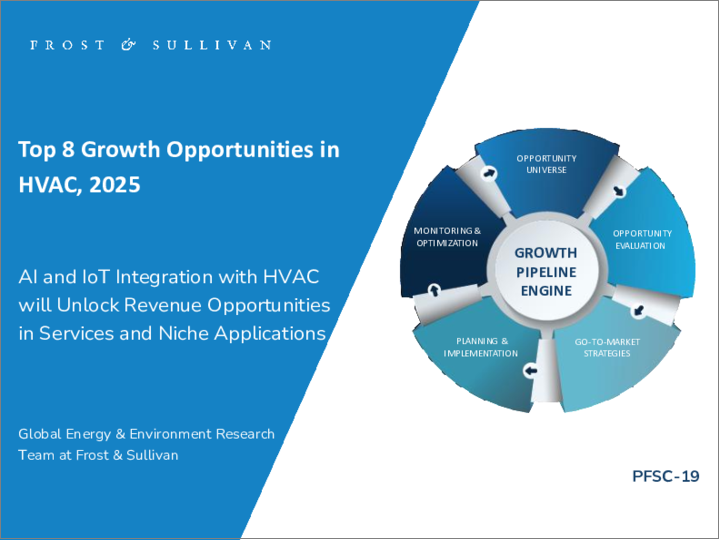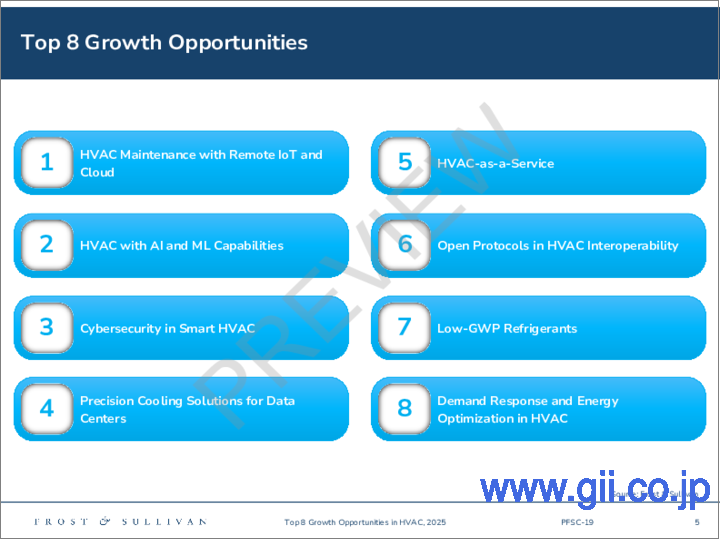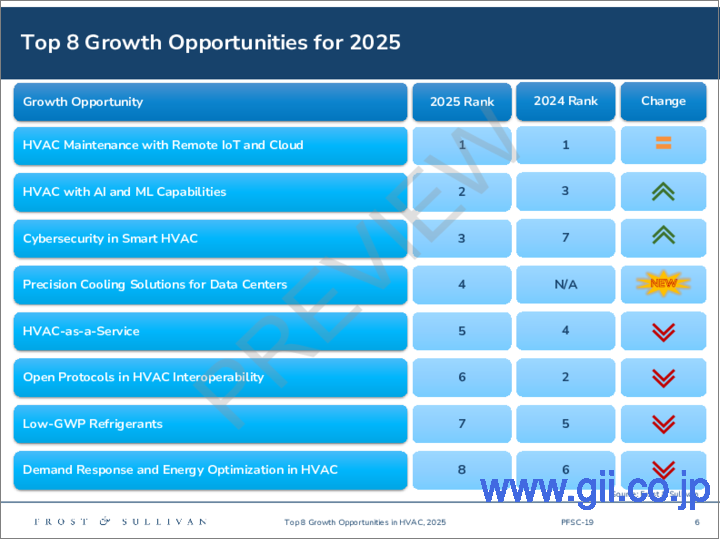|
|
市場調査レポート
商品コード
1724993
HVACにおける成長機会トップ8、2025年Top 8 Growth Opportunities in HVAC, 2025 |
||||||
|
|||||||
| HVACにおける成長機会トップ8、2025年 |
|
出版日: 2025年03月07日
発行: Frost & Sullivan
ページ情報: 英文 12 Pages
納期: 即日から翌営業日
|
全表示
- 概要
- 目次
AI・IoTのHVACへの統合が、サービスとニッチアプリケーションにおける収益機会を引き出す
この調査では、Frost & Sullivanは、2025年のHVAC業界を形成する主な動向を明らかにし、テクノロジー、持続可能性、進化する顧客ニーズの変革的影響にハイライトを当てています。
IoTとクラウドベースのソリューションの統合は、リアルタイムの遠隔監視、予測分析、ダウンタイムの削減を可能にすることで、HVACメンテナンスに革命をもたらしています。同時に、人工知能(AI)と機械学習(ML)の進歩は、運用効率を促進し、最適なシステム性能のためのデータ主導の洞察を提供し、エネルギー消費を最小限に抑えています。スマートでコネクテッドなHVACシステムの普及に伴い、機密データの保護を確実にするため、サイバーセキュリティが重視されるようになっています。
クラウドコンピューティングとエッジテクノロジーの急成長により、データセンターにおける精密冷却ソリューションの需要が高まり、エネルギー効率と拡張性に優れたHVAC設計の革新が促進されています。また、厳しい環境規制と持続可能性への取り組みを背景に、地球温暖化係数(GWP)の低い冷媒への移行も大きなトレンドとなっています。
さらに、HVAC-as-a-Serviceは顧客中心の価値提案として台頭しており、設備投資を削減し、積極的なHVAC管理と性能保証を通じて顧客満足度を高める柔軟なサブスクリプションベースモデルを提供しています。オープンプロトコルの採用は、HVACシステムとビルディングオートメーション制御間の相互運用性を強化し、スマートビルディングにおけるシームレスな統合を促進しています。
これらの動向は、技術の進歩、持続可能性への注目の高まり、顧客の期待の進化に後押しされたHVAC業界のパラダイムシフトを反映しています。これらの開発を総合すると、HVAC部門は、よりスマートで耐障害性に優れ、エネルギー効率の高いビルディングエコシステムをサポートする上で重要な役割を果たすことになります。
目次
主要な成長機会、2025年
- 戦略的インペラティブ
- 成長機会トップ8
- 成長機会トップ8、2025年
- 成長機会1:リモートIoTとクラウドによるHVACメンテナンス
- 成長機会2:AI・ML機能によるHVAC
- 成長機会3:スマートHVACにおけるサイバーセキュリティ
- 成長機会4:データセンター向け精密冷却ソリューション
- 成長機会5:HVAC-as-a-Service
- 成長機会6:HVAC相互運用性におけるオープンプロトコル
- 成長機会7:低GWP冷媒
- 成長機会8:HVACにおけるデマンドレスポンスとエネルギー最適化
- 免責事項
AI and IoT Integration with HVAC will Unlock Revenue Opportunities in Services and Niche Applications
In this study, Frost & Sullivan identifies and elaborates on the key trends that will shape the HVAC industry in 2025, highlighting the transformative impact of technology, sustainability, and evolving customer demands.
The integration of IoT and cloud-based solutions is revolutionizing HVAC maintenance by enabling real-time remote monitoring, predictive analytics, and reduced downtime. Simultaneously, advancements in artificial intelligence (AI) and machine learning (ML) are driving operational efficiency, offering data-driven insights for optimal system performance, and minimizing energy consumption. With smart and connected HVAC systems becoming more prevalent, the emphasis on cybersecurity is growing, to ensure the protection of sensitive data.
The rising demand for precision cooling solutions in data centers, driven by the rapid growth of cloud computing and edge technologies, is fostering innovation in energy-efficient and scalable HVAC designs. Another major trend is the shift to low-global-warming-potential (low-GWP) refrigerants, propelled by stringent environmental regulations and sustainability commitments.
Furthermore, HVAC-as-a-Service is emerging as a customer-centric value proposition, offering flexible, subscription-based models that reduce capital expenditures and enhance customer satisfaction through proactive HVAC management and guaranteed performance. The adoption of open protocols is enhancing interoperability between HVAC systems and building automation controls, fostering seamless integration in smart buildings.
These trends reflect a paradigm shift in the HVAC industry, driven by technology advancements, a growing focus on sustainability, and evolving customer expectations. Collectively, these developments position the HVAC sector to play a critical role in supporting smarter, more resilient, and energy-efficient building ecosystems.
Table of Contents
Top Growth Opportunities for 2025
- Strategic Imperatives
- Top 8 Growth Opportunities
- Top 8 Growth Opportunities for 2025
- Growth Opportunity 1: HVAC Maintenance with Remote IoT and Cloud
- Growth Opportunity 2: HVAC with AI and ML Capabilities
- Growth Opportunity 3: Cybersecurity in Smart HVAC
- Growth Opportunity 4: Precision Cooling Solutions for Data Centers
- Growth Opportunity 5: HVAC-as-a-Service
- Growth Opportunity 6: Open Protocols in HVAC Interoperability
- Growth Opportunity 7: Low-GWP Refrigerants
- Growth Opportunity 8: Demand Response and Energy Optimization in HVAC
- Legal Disclaimer






